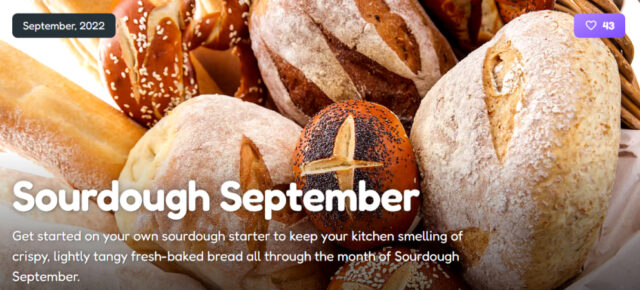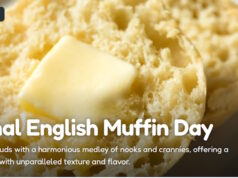
National Sourdough Bread Day on April 1st recognizes one of the world’s oldest leavened breads.
- Most likely the first form of leavening available to bakers, it is believed sourdough originated in Ancient Egyptian times around 1500 BC. During the European Middle Ages, it also remained the usual form of leavening.
- As part of the California Gold Rush, sourdough was the principal bread made in Northern California and is still a part of the culture of San Francisco today.
- The bread was so common at that time the word “sourdough” became a nickname for the gold prospectors.
- In The Yukon and Alaska, a “sourdough” is also a nickname given to someone who has spent an entire winter north of the Arctic Circle. It refers to their tradition of protecting their sourdough during the coldest months by keeping it close to their body.
- The sourdough tradition was also carried into Alaska and western Canadian territories during the Klondike Gold Rush.
- San Francisco sourdough is the most famous sourdough bread made in the United States today. In contrast to sourdough production in other areas of the country, the San Francisco variety has remained in continuous production since 1849, with some bakeries able to trace their starters back to California’s Gold Rush period.
- The liquid alcohol layer referred to as ‘hooch’ comes from a Native American tribe called Hoochinoo. The Hoochinoo used to trade supplies with Alaskan gold miners for the ‘hooch’ off the top of their sourdough starters.
- Barm is the English term for sourdough starter. It is derived from the term ‘barmy’ which means tipsy, or ditzy. This is because of the alcohol!
- Diabetics can benefit from eating sourdough bread. It has a low glycemic index, which means it will not spike your blood sugar.
- Studies have shown that eating sourdough for breakfast will also help you process your lunch more beneficially.
- The ancient Greeks were already producing more than 80 types of bread in 2500 B.C.
- The Romans kneaded their dough with horse-driven mixers
- The word ‘supper’ comes from the Frankish word ‘suppa’ and later the English word ‘sop’. This came about from the use of bread to ‘sop-up’ the last of a soup or meal during the Roman Empire.
- It takes 9 seconds for a combine to harvest enough wheat to make about 70 loaves of bread.
- Bread is closely tied to religious expression and communion. Hot cross buns commemorate Lent and Good Friday, Greek Easter breads are set with eggs dyed red to denote the blood of Christ, and Jewish families celebrate the coming of the Sabbath on Friday evening with challah.
- Scandinavian traditions hold that if a boy and girl eat from the same loaf, they are bound to fall in love.
- Superstition says it is bad luck to turn a loaf of bread upside down or cut an unbaked loaf.
- Legend says that whoever eats the last piece of bread has to kiss the cook.
Sources:












